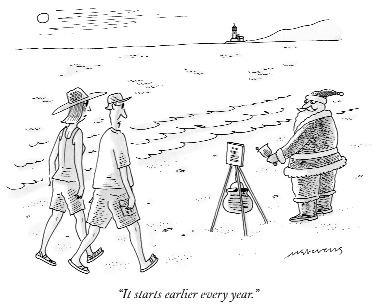Century Marks

Change of heart: When Beth Slevcove moved into the center of a large city, she embraced everything about urban life—except for the guys who ran the tattoo parlor across the street and who got into fights, harassed women and intimidated men. One day Beth decided to get a tattoo herself. She walked over to the tattoo parlor and told them she wanted “Love thy neighbor” inscribed on her wrist, explaining that she was having trouble loving her neighbors because of their fighting. One of the tattoo artists said to the proprietor, “Manuel, dude, we’re scaring our neighbors. We got to stop fighting.” After that, the fighting ceased and the sidewalk seemed safe. Several months after she got the tattoo, Beth ran into Manuel. He gave her a big hug and said to a friend, “Here, this is my neighbor, the one I was telling you about” (Sun, August).
Mourning vocation: Novelist Mary Gordon’s father died when she was a young child, and just a year and a half later her mother sent her to a boys camp in the Adirondacks where her aunt was the nurse and her grandmother the cook. She was still grief-stricken from the loss of her father. Her aunt tried to try to cheer her up by taping by her bed a postcard of Mad magazine fictional mascot Alfred E. Neuman with the words, “Keep smiling.” Though Mary was miserable, her camp experience taught her something crucial: “It will be one of the important jobs of my life to honor mourning. To acknowledge that the work of mourning is an honorable job, to insist that its wages be paid, that it be given its due” (Circling My Mother: A Memoir, Pantheon).
Cut it off: Several studies in Africa have confirmed the fact that men who have been circumcised have less chance of contracting the HIV virus. Since African Muslims are much more likely to be circumcised than are Christians, predominately Muslim areas such as Senegal and northern Nigeria have a lower rater of HIV than more Christian areas. Christian groups don’t prohibit the practice, but circumcisions are much less common among them. Getting more males to accept the procedure could help turn the tide of the AIDS epidemic. The challenge for health authorities is to make circumcisions medically safe in regions where there are few doctors, scant medical supplies and minimal health regulations, and where ritual circumcisers do the procedure without sterilization or even bandages and where quacks take advantage of a commercial opportunity. The U.S. has promised financial assistance through the President’s Emergency Plan for AIDS Relief (Wall Street Journal, September 7).
Give the Earth a break: Religious groups concerned about the environment need to take the Sabbath seriously, argues Christopher D. Ringwald, author of A Day Apart: How Jews, Christians, and Muslims Find Faith, Freedom, and Joy on the Sabbath. Acknowledging that hospital and police department personnel have to keep working on Sunday, he calls on the rest of us to avoid using combustion engines on the Sabbath. Taking the Sabbath seriously could reduce our energy consumption by 14 percent (Christian Science Monitor, September 12).
Faith under fire: No one knows how many covert Christians there are in repressive North Korea. Supposedly Christians are free to practice their faith there. Officially, Pyongyang, the capital, has one Roman Catholic, one Russian Orthodox and two Protestant churches. But Kim Jong Il, who operates a state-run personality cult, feels threatened by any rival faith. Some claim that the country’s Christians bury their Bibles in vinyl in their backyards. And Chinese pastors along the border conduct brief services by mobile phone, but the regime uses GPS trackers to find the phones. About 5 million Christians fled to the South at the beginning of the Korean War. Forty percent of South Koreans claim to be Christian (Newsweek, September 17).
A Christian nation? According to an annual poll measuring American attitudes about freedom of religion, speech and the press, 55 percent believe that the country’s founders wrote Christianity into the U.S. Constitution (Chicago Sun-Times, September 12).
Muslim laughs: A cadre of Muslim comics is both playing on and attempting to break down stereotypes of Muslims. For instance, Azhar Usman quips, “Everyone is very nice to me once the plane lands.” A well-known female comic introduces herself by saying, “My name is Shazia Mirza. At least that’s what it says on my pilot’s license.” Tissa Hami asks: “Why are there so few female Muslim comics? I didn’t want competition, so I stoned them.” Maysoon Zayid says, “It should be the goal of every Arab man to marry one of the Bush twins. And if you are Muslim and Arab, try to marry both” (Haroon Siddiqui, Being Muslim, Greenwood).
Poisonous pundit: Conservative Ann Coulter spouts such incendiary lines as “Liberals don’t recognize the existence of evil; the closest thing to it in their vocabulary is Wal-Mart.” And she recently quipped that terrorists are “Democrats with more gumption.” When asked how as a Christian she could justify such attacks, she replied that Jesus also used sarcasm and jokes to make his points (People for the American Way).




